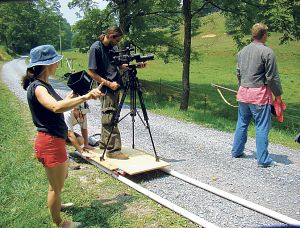

Setting up a scene in "This is Not the South" are, left to right, Karen Sabo, producer; Derek Davidson, director (pushing dolly); Tim Altonen, director of photography; and Ryan Perry, actor.
*** Published: July 31, 2009, in the Bristol (Va.) Herald Courier. ***
A new locally produced film addresses the reality of life in Southwest Virginia. The film, called "This is Not the South," focuses on the lives of three young Bristol, Va., residents as they interact with their community and each other.
Actor Ryan Perry, a native of Coeburn, Va., who has performed the role of Jack Hale in the outdoor drama "The Trail of the Lonesome Pine," plays one of the lead roles in the film. He describes his character as an aspiring filmmaker who intends to make a movie about the Civil War.
"My character wants to make a movie about the Civil War, and I have enlisted my friend Julian, who is an African American and owns an antique shop in downtown Bristol to help me," he said. "We encounter a young white woman by the name of Dale that I recognize from high school who recently moved back home from a stint in the North that needs help getting a job as a mechanic."
However, the character quickly finds that his film has changed direction.
"My film turns more into a Julian and Dale show than anything having to do with the Civil War. Julian addresses what it is like to be an African-American male in the South, and Dale still can't find a job," Perry said.
The attitudes implied and their consequences on human relationships form major components of the plot.
"It does not try to hide any stereotype that has been laid down about the Appalachians, but instead it brings it to the forefront of the mind and asks to be answered, changed or accepted." Perry said.
Kirstie Sensky, a Bristol, Va., native who has appeared in productions at Theatre Bristol and Virginia Intermont College, portrays Dale in the film. She explains that prejudice is only one of the struggles her character faces.
"During the film, Dale struggles with interactions with people, her own prejudices against someone whom she thinks is gay, the meaning that people put behind things, her relationship with her father and who she is as a person."
Confronting personal biases is a key message of the film.
"We wanted to tell the real story of the area," said producer Derek Davidson, an Ohio resident and former coordinator of Barter Theatre's Appalachian Festival of Plays and Playwrights. "It's about dashing stereotypes."
That includes the preconceptions many have about the Appalachian region.
But the film is about much more than challenging set ideas. Like the city it reveals, the true story is complex.
Davidson explains that the film is about human relationships as well as the tensions every community faces.
"It's about how beautiful Bristol is. It's about friendship and people interacting with other people on a personal level." he said.
It is the personal aspect of the film that he believes makes it accessible to a wider audience, and the film has been entered in national film festivals like the Southern Appalachian Film Festival, the Secret City Film Festival and IndieMemphis.
"It's a quiet, soft film, and that's not for everybody," he said. "But it's a story that relates to any community dealing with stereotypes."
Although the story may appeal to a variety of audiences, it is anchored in Bristol and the surrounding region.
All filming took place in Bristol, and most members of the cast and crew are local residents. Several cast members, like producer and actress Karen Sabo, will be familiar to patrons of Barter Theatre.
Others have starred in productions at East Tennessee State University and Virginia Intermont College. Each crew member has experience with local film production.
"This film is about two things: local and sustainable," Davidson said. "Now that we can shoot things digitally in good quality, it's no longer cost prohibitive to do a local film."
The cost of filmmaking was also lowered by Bristol businesses and individual volunteers. Tootie's and the Burger Bar, both Bristol icons, donated food to the set and are featured in the film. Bristol's abandoned Robert E. Lee Motel also appears as a painting during the film.
"This is Not the South" was shown at the Abingdon Cinemall.
-- To read a review click HERE.